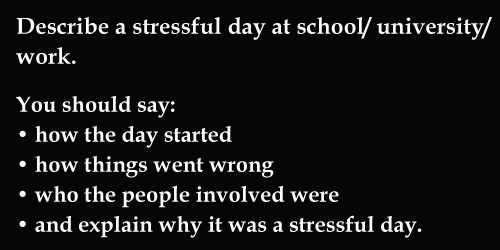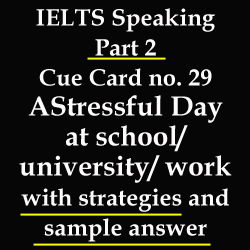IELTS Speaking Topic Card/ Cue Card: A stressful day at school/ university/ work With strategies, Model answer and vocabulary explanations
Today’s post is based on an IELTS Speaking cue card which is a stressful day at school/ university/ work. This is a common topic card and many candidates have encountered this topic in their IELTS Speaking test. I’ve offered a simple yet strong answer. You will also find the explanations of different vocabularies just below the sample answer to this cue card.
So, let’s take a look at the cue card first.

Strategies to answer:
We can see here that this cue card wants us to talk about a day that was stressful/ worrying/ nerve-wracking/ tense/ demanding/ distressing for us. The experience might be in our school life, college life, university life, or workplace.
There are four points on which we need to focus while we speak for 2 minutes on this cue card. So, we need to prepare some short notes on these points. Here is one example which you can follow:
- first job as an account officer
- the day started with a late arrival at the office— reason– bus didn’t come
- boss was unhappy, and gave a lecture on being punctual– made me irritated and shameful
- new job, lots of information to arrange– find out a faulty transaction, couldn’t do it
- being late made the day stressful, should have taken a better prep
Your notes need not be so long like this. You can write in short using signals as well.
You can also write a few important vocabularies which pop up in your mind while taking notes.
For example:
Recall, expectation, anticipated, regrettably, traumatic, hectic, responded, speech, elderly etc.
Now, let’s have a look at the model answer that I’ve prepared for you.
Model Answer:
Thank you for the card. Like every other person, I have had some experiences having a stressful day both in my university life and work life. I’m going to share one of those stressful days at my workplace. I particularly recall it because it was my first day at the office. I have just got a job as Account Officer in a multi-national company and was very excited to have a new job and with expectations of gathering funny and enjoyable experiences, I went to my office. Unfortunately, the day did not go as I anticipated. Rather, it became stressful.
Like all other days, I woke up early in the morning and had my exercises done. After having only a cup of tea and biscuits I went out. Regrettably, the bus which was bound for my office did not happen to come. The first thing went seriously wrong. I waited at the bus stop for 30 minutes. Later, I had to call an Uber driver, who was a local friend of mine and he responded pretty quickly and managed to take me to my office. Yet, I was 10 minutes short of the reporting time. My very first day at the office started with a late arrival.
Initially, I had to check in with my fingerprint and reported at the reception. The receptionist took me to the director’s office. She introduced me to him. He was an elderly person but I could see in his face that he was not much excited or happy to meet me. I could understand the reason because I was late for my first day at the office. He told me to sit. Then he directly asked me why I was late. I explained the situation but he looked at me as if I was making up a story. Then he gave me a short speech on being timely in action and so forth. Though he was saying some good things, I felt quite annoyed and shameful.
Next came my job responsibilities which were explained by my senior officer. When I saw a computer for me full of important and confidential financial documents, I became completely nervous. I started panicking and the only thought that came to my mind was that I might have made a mistake choosing this job. The whole day I had to check several transaction documents to find a missing figure of $10000 which was my first task at the office. But I couldn’t find it whatever the ways I tried. The day ended with an utter failure.
I think I could manage the whole stressful day if I had a good start. Being nervous at the beginning of a new job made my whole day traumatic. So, like many people, I remember this day as one of the most nerve-wracking days of my life.
Thank you.
That is the end of this model answer.
Important vocabulary with explanations from the model answer:
Stressful: (adjective) demanding, taxing, worrying, hectic, nerve-wracking
Recall: (verb) remember, bear in mind, call to mind
Excited: (adjective) eager, agitated, thrilled, overjoyed
Expectation: (noun) hope, anticipation, belief
Gather: (verb) collect, assemble, get together
Unfortunately: (adverb) regrettably, unluckily
Anticipated: (verb) to expect, to hope, to look forward to
Regrettably: (adverb) unluckily, unfortunately
Bound for: (phrase) heading for, destined for, going to
Responded: (verb in the past form) reacted, acted in response, answered
Arrival: (noun) entrance, influx, coming
Receptionist: (noun) a person employed to receive and assist callers, clients, customers etc., as in an office.
Elderly: (adjective) old, aged
Speech: (noun) lecture, address, talks
Annoyed: (adjective) aggravated, irritated
Shameful: (adjective) disgraceful, shocking
Responsibilities: (plural noun) duties, obligations, tasks
Confidential: (adjective) secret, private, classified
Financial: (adjective) economic, monetary, fiscal
Document: (noun) text, file, article, paper
Nervous: (adjective) anxious, worried
Panicking: (verb in the present participle form) feeling nervous, feeling worried too much
Transaction: (noun) deal, contract, business deal
Utter failure: (noun phrase) complete disappointment
Traumatic: (adjective) hectic, stressful,
Nerve-wracking: (adjective) hectic, stressful, traumatic
IELTS Speaking Part 2: A teacher who has greatly influenced your academic life
Cambridge IELTS 12 Test 5; complete the Speaking test with model answers
IELTS Speaking Part 2: Something useful you learned from your family
Model answer to IELTS Speaking Part 2: An outdoor activity
IELTS Speaking Part 2: A rule you didn’t like at school




3 thoughts on “IELTS Speaking Topic Card/ Cue Card: A stressful day at school/ university/ work With strategies, Model answer and vocabulary explanations”